|

June 18, 1960:
CKGM founder-owner Geoff Stirling * throws a well-attended official
inaugural cocktail bash for staff and guests six months after
the station’s debut on the Montréal airwaves. A “super”
time is had by all.
Le 18 juin, 1960 : la grande fête d’inauguration
de la station CKGM a lieu à Montréal six mois après
l’entrée en ondes de la station. Un baptême “super”
réussi.
October 15, 1960:
Although not an on-air member of the station's original day one line-up, CKGM Super 60s jock and recent addition Dave Boxer * becomes a popular emcee at high school dances in and around Greater Montréal. On this night, Dave is the emcee of a Saturday evening party at Granby High School featuring the Boogiemen. Dave's first tenure at CKGM is fairly short-lived as he moves on less than a couple of years later to CFCF 600 Montréal. He will soon enjoy unprecedented success at CFCF with his weekday evening teen radio show, riding the wave of the British musical invasion throughout the mid-Sixties. Boxer eventually returns for a second on-air stint at CKGM for a few months in 1969.
Le 15 octobre, 1960 : la nouvelle station CKGM est tr√®s populaire dans la grande r√©gion de Montr√©al et leurs animateurs font des sorties fr√©quentes. Le nouvel arriv√© Dave Boxer * se retrouve sur la sc√®ne d'un high school de Granby en ce samedi soir d'octobre pour y animer et pr√©senter le groupe musical the Boogiemen. Dave Boxer quittera 980 CKGM pour CFCF 600 quelques temps plus tard. C'est sur les ondes de CFCF que Boxer conna√ģtra un succ√®s monstre √† Montr√©al √† l'animation de son 'teen show' quotidien en soir√©e. Il retournera √©ventuellement √† CKGM l'instant de quelques mois en 1969.
January 20, 1961: CFCF TV 12 goes to air for the first time in Montreal from temporary digs in the Avon Ballroom. The new English language
private broadcaster will move later that summer into offices at 405 Ogilvy
Avenue where it will broadcast from for many subsequent decades.
One of the first shows to appear on the grid is the hugely-popular Saturday
evening teen program ‘Like Young’ hosted initially by June Mack,
Jim McKenna and 980 CKGM’s Bob Gillies *, the latter who serves for the
first couple of years of the program’s near two-decade run. Gillies *, a versatile
communicator and singer, will also host a short-lived charades show called ‘Four To Go’ in those first few months on CFCF TV 12.
Le 20 janvier, 1961 : une nouvelle station de télévision privée anglophone
fait son apparition dans le paysage télévisuel de la Métropole. CFCF 12
connaît un succès monstre dès ses débuts, offrant une programmation
variée qui met à l’affiche, entre autres, la populaire émission du samedi soir
pour ados, ‘Like Young’. Semblable à ‘American Bandstand’ aux Etats-Unis
et au ‘Club des Autographes’ ou à ‘Jeunesse d’Aujourd’hui’ à la télé francophone du Québec, ‘Like Young’ voit le jour à CFCF 12 avec un trio d’animateurs.
Il s’agit de June Mack, Jim McKenna et de Bob Gillies *, ce dernier un animateur
vedette de la radio de CKGM. M. Gillies * anime aussi le télé-quiz ‘Four To Go’
pendant son court séjour au ‘canal 12’.
October 15, 1961: 980 CKGM and 1280 CJMS present the touring show
“Dick Clark’s Caravan of Stars” at the Montréal Forum. This particular edition of the annual star-studded traveling show features Clarence Henry, Linda Scott, Duane Eddy, Chubby Checker and headliner Paul Anka, all presented on stage by Mr. Clark *.
Le 15 octobre, 1961 : CKGM et CJMS présentent conjointement la tournée musicale “Dick Clark’s Caravan of Stars”
au Forum de Montréal. La brochette de grands noms comprend cette fois : Paul Anka, Chubby Checker, Duane Eddy, Linda Scott et Clarence Henry, tous présentés à tour de rôle sur scène par M. Clark *.
Date Unknown, 1962:
A catchy ode to “Canada’s Metropolis” called
“Montreal
My Home Town” premieres on CKGM. Credited to “The CKGM Singers”, the tune is really a generic musical creation of PAMS Productions, a Dallas Texas-based advertising jingle production company. Although the melody remains the same from city to city, the lyrics and vocal credits change according to the various radio markets and stations it plays for in North America and the UK.
(Writer: PAMS' Euel Box, singer: female vocalist Terry Lea Jenkins) Not intent on becoming one-hit wonders, “The CKGM Singers” would follow their debut ditty with the catchy
“Have A Ball In Montreal”
Date inconnue, 1962 : la
chanson “Montreal My Home Town” en hommage à
“la métropole canadienne” attire l'attention
sur les ondes de CKGM. Créditée à la formation
“The
CKGM Singers”, cette chanson accrocheuse est l'initiative
de la compagnie de ritournelles publicitaires PAMS de Dallas, Texas.
Bien que la mélodie demeure toujours identique, les paroles
et les crédits sont adaptés selon les villes et marchés
radiophoniques où la chanson est diffusée.
(Auteur-compositeur : Euel Box, interprète: Mme Terry Lea
Jenkins)
“The CKGM Singers” proposeront par la suite une seconde offrande en hommage à Montréal intitulée, “Have A Ball In Montreal”
June 28 , 1962: An unknown folksinger by the name of Bob Dylan plays Montréal for the first time at the back of a small club right around the corner from radio station CKGM, then situated at 1455 Drummond. The club is known at this time as “Le PotPourri” (later The Seven Steps), located at 1432 Stanley Street. Dylan is booked for 4 evenings and is payed $125.00 for his total stint, playing in front of only a handful of nightly patrons. Dylan extends this first Montréal visit by performing an additional one-nighter on July 2nd at The Finjan Club on Victoria Street. Little does anyone suspect that this unknown folkie is just three short Julys away from recording one of the most influential songs of all time, the seminal “Like A Rolling Stone”. The tune will dominate “right around the corner” on the CKGM hit chart and on countless other surveys in the early autumn of 1965.
Le 28 juin, 1962 : un chansonnier folk américain inconnu du nom de Bob Dylan est engagé pour 4 soirs au club Le PotPourri du 1432 Stanley à Montréal, situé à un coin de rue de la station CKGM domiciliée à l’époque au 1455 rue Drummond. A sa première visite dans la métropole, Dylan est payé un total de $125.00 pour ses quatre prestations à l’arrière du club devant quelques clients et habitués. Un dernier engagement suivra au Finjan Club de la rue Victoria, le soir du 2 juillet. Bien malins sont ceux qui auraient pu prédire que Dylan en était
‘‘à un coin de rue” de la gloire...et des sommets du palmarès CKGM et des autres radios Top 40 nord-américaines avec ses compositions et son style qui allaient en influencer plus d’un.
April 1, 1963:
In one of the greatest radio stunts ever, the disc-jockeys of 980 CKGM Montréal trade places with their counterparts of 1050 CHUM Toronto. Going to Toronto for the day from CKGM are:
Charlie Johnson,
Dick Varney*,
Barry King,
Bob Gillies* and
Jim Turner.
To Montréal from CHUM: Al Boliska*,
Bob McAdorey*, John Spragge*, Dave Johnson* and Bob Laine*. April Fool's !
Le 1ier avril, 1963 : les deejays de 980 CKGM Montréal et leurs confrères de la station 1050 CHUM de Toronto changent de décor pour ne pas dire changent de ville l'instant d'une journée. Suite à la substitution, les auditeurs/trices des deux stations dans les deux villes respectives se posent de sérieuses questions pendant plusieurs heures à savoir, mais diable, qu'est-ce qui se passe ?! Poisson d'avril !
February 23, 1963:
a Molotov cocktail is tossed inside the lobby of the CKGM studios
located at 1455 Drummond Street. Le Réseau de Résistance,
soon to become Le Front de Libération du Québec
(FLQ), claims responsibility for the act. No one is injured. (See October 10, 1970 CKGM History Brief)
Le 23 février, 1963 : un cocktail Molotov est projeté
dans le lobby de la station CKGM, située au 1455 rue Drummond.
L’attentat est revendiqué par le Réseau de Résistance
qui deviendra bientôt le FLQ. Aucun blessé.
(voir Ephéméride historique de CKGM du 10 octobre, 1970)
July 16, 1963:
Geoff
Stirling * launches CKGM-FM at 97.7 on the dial in Montréal, simulcasting at first the programming of 980 CKGM-AM. It isn’t until a little later on September 1st before CKGM-FM flies on its own with a middle-of-the-road, largely instrumental sound.
| Le 16 juillet, 1963 : lancement par Geoff Stirling * de Maisonneuve Broadcasting de la nouvelle station anglophone CKGM-FM sur la fréquence 97,7 à Montréal. Cette dernière diffuse pendant quelques semaines les émissions de 980 CKGM-AM. C’est le 1ier septembre 1963 qu’elle amorce enfin sa programmation prévue, à saveur instrumentale. |
|

1963-1971 |
Autumn, 1963: CKGM gives airplay to the novelty song "
Big John Beliveau
" written and sung by a local Verdun-born singer, Bob Davies *. This recorded nod to Canadiens icon Jean Béliveau * is credited to Davies' band, Big Bob and the Dollars, on Globe Records. He pens and records several novelty tunes saluting other legendary NHL-ers such as Gordie Howe *, Boom Boom Geoffrion *, Bobby Hull and Frank Mahovlich during his limelight years. Bob's group, later-known as the Bobsmiths, will appear on the opening bill in support of British Invasion stars the Dave Clark Five at the Montreal Forum, October 29, 1964.
Automne, 1963 : CKGM accorde un bel appui à un hommage sur disque au capitaine du Tricolore,
Jean Béliveau *. La chanson «
Big John Beliveau » est la création de
Bob Davies *, un chanteur natif de Verdun. Pendant cette période,
ce fantaisiste parodie aussi sur disques d'autres hockeyeurs de l'époque tels les Gordie Howe *, Bernard Geoffrion *, Bobby Hull et Frank Mahovlich. Le groupe de M. Davies *, les Bobsmiths, assurera la première partie du spectacle des Dave Clark Five au Forum, le 29 octobre 1964, avec la complicité de Pierre Lalonde *,
des Beatlettes, de Mickey Day, des Four Frenchmen et des Esquires.
September 8, 1964:
CKGM welcomes the
Beatles to the city for a pair of wild shows at the Montréal
Forum. Emceeing the matinée and evening mayhem:
CKGM Super 60s jock Buddy
Gee (aka George Morris *), Michel Desrochers * from 1280 CJMS and
CFCF 600's Dave
Boxer *. The latter would fly to London the following year with petition in-hand in an effort to convince the Fabs to return to Montréal for their Tour of '65. Concert ticket fraud (suspected but never proven) and a rumoured death threat by the terrorist FLQ faction on Ringo Starr’s life (a hoax as it turns out) result in Beatles’ manager Brian Epstein * vowing the group would never play Montréal again. A malicious few spoil things for all as Epstein * holds a grudge and makes good on his threat, inspite of the valiant effort of “Montréal’s Fifth Beatle”, Dave Boxer *. The Beatles’ North American tours of 1965 and 1966 both exclude the city.
Le 8 septembre, 1964 : CKGM est omniprésente aux
deux spectacles endiablés des Beatles au Forum de Montréal. Leur seule et unique visite à
vie (en tant que groupe) en sol québécois. Les animateurs
: Buddy Gee (George Morris *) de CKGM, Michel
Desrochers * de CJMS
et Dave Boxer * de CFCF.
April 23, 1965: CKGM’s Club 980 Super 60s jocks Bob Gillies * and Lord
Tim * (aka Timothy Bromwell-Hudson) present the first concert by the
Rolling Stones in Montréal (Maurice Richard Arena, 5,000 fans, pre-"Satisfaction"). CFCF 600’s Dave Boxer * and 1280 CJMS’ Michel Desrochers * are also on hand as co-presenters of the show. Because of miscues and the riotous atmosphere in the air, Montréal’s popular local heroes JB & the Playboys never get to play that night. Desrochers * and CFCF 12 “Like Young” TV host
Jim
Mckenna are two of a few media-types who had interviewed the band at the Sea Way Motel on Guy St., on the 22nd, the day prior to the show. Note: The Stones return to Montréal later in the year, on October 29th 1965, this time at the Forum. Among the opening acts on this October night: Montréal local favorites Bartholomew Plus Three
Le 23 avril, 1965 : CKGM et son "Club 980", de concert avec CFCF 600 et 1280 CJMS, présentent le premier spectacle des Rolling Stones à Montréal devant environ 5,000 fans à l’Aréna Maurice Richard. Soirée écourtée qui se termine dans la cohue totale au grand dam des animateurs du spectacle soit Lord Tim * et Bob Gillies * de CKGM, Dave Boxer * de CFCF et Michel Desrochers * de CJMS. Les Rolling Stones étaient arrivés à Montréal la veille directement de Paris, suite à trois prestations à l’Olympia. Les Stones reviendront à Montréal plus tard cette même année, soit le 29 octobre 1965, mais cette fois sur la scène du Forum
August 23, 1965: the first open-line show appearance of controversial host Pat Burns * in Montréal. While 980 CKGM is still very much a hit music station, ownership and management decide to capitalize on the fledgling “open-line” genre by repatriating the Montréal native from Vancouver. The bombastic Burns * had just been let go from CJOR radio there, following repeated on-air offenses.
Pat Burns
* so stirs up the Québec political scene in Montréal during this period that CKGM receives several bomb threats. The misogynistic gay-bashing host is eventually run out of town in early 1969 following numerous anti-French remarks and censorship by the Bureau of Broadcast Governors / CRTC. “
Goodbye, doll!
”
By decade’s end, CKGM has plummeted to dead last in the Montréal radio game. The mending and rebuilding process is about to begin, in earnest.
Le 23 août, 1965 : ce sont les débuts de l’animateur de lignes ouvertes controversé
Pat Burns
* à CKGM. Ses propos misogynes, anti-gais et anti‑francophones lui attirent une notoriété peu enviable dans la métropole et au delà. La station de la rue Drummond devient dailleurs régulièrement la cible d’alertes à la bombe pendant cette période. Pat Burns * sera éventuellement censuré et muselé par le “Bureau of Broadcast Governors / CRTC” et quittera CKGM et Montréal dans les premiers mois de 1969, sans que beaucoup de larmes soient versées. Mais le dommage est fait. CKGM aura une pente considérable à remonter avant de regagner la faveur du public montréalais, toutes langues confondues.
All Year, 1966: a highly captivating and competitive twelve months on the AM dial in Montréal as
980 CKGM
battles it out with
CFCF 600
and
1470 CFOX,
the latter station barely a year into its switch from a Country format to 24 / 7 Top 40. CFOX would more than hold its own against the other two giants, despite a less-than-advantageous broadcast pattern on 1470 AM.
Toute l’année, 1966 : la compétition “Top 40” à Montréal est plus intense que jamais sur la bande MA entre CKGM, CFCF et CFOX. Côté francophone, c’est une lutte à finir entre les stations 1280 CJMS, CKAC 730, 850 CKVL et CKLM 1570 qui affichent soit, plusieurs émissions de palmarès hebdomadaires ou des formats musicaux sept jours-semaine. Le “hit” est à l’honneur partout !
May 10, 1966: On this day, Jo Anne Rudy joins 98 CKGM. She will be a staple in the management offices, at both 1455 Drummond St. and later on 1310 Greene Avenue, during a remarkable four-decade span, weathering many format and ownership changes. Often the lone woman in the upper echelons of the radio combo management teams, Jo Anne contributes with efficiency, reliability and elegance in various departments during her time with CKGM and CHOM-FM, successively as credit officer, controller, station manager and as operations manager. Jo Anne ultimately retires from CKGM-CHOM in 2001, moving on to other projects, most notably including her dynamic work for many years with the Quebec Breast Cancer Foundation.
Le 10 mai, 1966 : une nouvelle employ√©e, Jo Anne Rudy, fait ses débuts à CKGM. Mme Rudy fera partie de plusieurs équipes d’employés et de cadres au fil des décennies, autant durant l’époque de la station sur la rue Drummond à Montréal que celle de l’avenue Greene à Westmount. Elle sera à tour de rôle préposée au crédit, contrôleure, gérante de station et directrice des opérations, veillant ainsi sur les destinées de CKGM et de sa station sœur CHOM-FM. Presque toujours la seule femme dans les bureaux de la direction, Jo Anne Rudy se taillera une place enviable qui englobe une période de 35 ans à CKGM / CHOM. Suite à sa retraite radiophonique, elle joindra pendant quelques années les rangs de la Fondation du cancer du sein du Québec.
April 27-October 27,
1967: CKGM broadcasts on location for most of the
summer from Montréal’s hugely successful world fair,
Expo’67.
CKGM Super 60s jock Buddy Gee (aka George Morris *) entertains live
at Expo’s amusement park, La Ronde, from a glass trailer appropriately
coined “The Buddy Gee Pavilion”.
Fun and frolic with over 50 million visitors.
Le 27 avril-27 octobre, 1967 : CKGM diffuse en direct de
l’Expo’67
à Montréal pour la majeure partie de l’été.
L’animateur Buddy Gee (George Morris *) divertit les foules
depuis sa roulotte vitrée stationnée à La Ronde
pendant plusieurs semaines de cet inoubliable été de 1967.
April 14, 1969:
CKGM is the original English-language / first-year radio voice of
Canada’s first Major League Baseball franchise, the Montreal
Expos.The new ball club narrowly defeats the visiting St Louis
Cards 8-7 at Jarry Park in this the first-ever MLB game played outside
of the US. The Expos had also defeated the NY Mets 11-10 earlier
on April 8 at Shea Stadium in the first-ever MLB game featuring
a Canadian club. Play-by-play: Dave Van Horne and Russ Taylor *.
More history is made shortly after on April 17, 1969 in Philadelphia
as the Expos
blank the Phillies 7-0 on a
Bill Stoneman No Hitter on CKGM.
Le 14 avril, 1969 : Etant le radiodiffuseur anglophone
original des Expos
de Montréal dans leur première année, CKGM
présente les débuts du baseball majeur en ville (et
au Canada) en direct du Parc Jarry. La nouvelle concession montréalaise
remporte ce match d’ouverture de justesse 8 à 7 face
aux Cards de St-Louis devant 29,184 fans. C’est CKLM qui assure
la radiodiffusion francophone initiale avec Jean-Pierre Roy et Jean-Paul
Sarault à la description des exploits de ‘Nos-z-Amours’.
May 26-June 2, 1969:
Montréal is again the focus of the world as Beatle
John Lennon * and wife Yoko Ono set up shop for a week at the stately Queen Elizabeth Hotel, Rooms 1738-40-42, to promote world peace with yet another “Bed-In”. CFOX Montréal jocks
Roger Scott * and
Charles P. Rodney Chandler * (later appearing as "Todd Young" for contractual reasons
on CKGM in 1972) broadcast live bedside for most of the frenzied
media affair. Both appear on the bedroom anthem “Give Peace
A Chance” recorded in the main Room (# 1742),
on June 1st.
Le 26 mai-2 juin, 1969 : John
Lennon * et Yoko Ono s’installent à Montréal
dans les chambres 1738-40-42 de l’Hôtel Reine Elizabeth
afin de publiciser leur message de paix en effectuant un “Bed-In” d’une
semaine. Les animateurs de la station 1470 CFOX, Roger
Scott * et son confrère Charles P. Rodney Chandler * (plus
tard devenu “Todd Young” en 1972 sur les ondes de CKGM,
pour raisons contractuelles) diffusent leurs émissions en
direct de la chambre # 1742 pendant le séjour. Les deux compères
participent à “Give Peace A Chance” enregistré
sur place.
October 28, 1969:
On-air personality Doug
Pringle is given the nod by maverick owner
Geoff Stirling
* to launch a new era of FM rock radio in Montréal as ‘beautiful music’ CKGM-FM officially becomes the 24-hour album-oriented rock 97.7 CKGM-FM. Following the transition instrumental "Also Sprach Zarathustra", the first song played on the official format switch: ‘Here Comes The Sun’ from
the
Beatles' Abbey Road album.
The CKGM-FM call letters will eventually be dropped two years later, in 1971, as the CHOM era then begins on 97.7.
Le 28 octobre, 1969 : les douces pièces instrumentales
de CKGM-FM
font place au nouveau style de radio MF ‘underground’ 24 heures sur 24. Ce ne sera qu’en 1971 que disparaîtront pour de bon les lettres d’appel CKGM-FM, remplacées par C-H-O-M. Le britannique Doug Pringle
et le québécois Robert
“Bobby” Boulanger
y seront, entre autres, deux des animateurs influents au fil des années 70.

January 1, 1970: A revamped and temporarily commercial-free 98 CKGM
(led by the newly-arrived Jim Sward) sets out on a mission to defeat Top 40 AM arch‑rival 1470 CFOX (owned by Gord Sinclair *).
Le 1ier janvier, 1970 : en début de décennie et de renaissance, CKGM se lance sérieusement à l’assaut de sa grande rivale 1470 CFOX (située à Pointe-Claire en banlieue de Montréal). |
|

1970-73 |
March 9, 1970: Following a brief absence, John Mackey returns to 980 CKGM as Program Director. He will be a key figure in steering the station's 70s Top 40 renaissance early on in a major way, recruiting top talent such as Donny Burns, Ralph Lockwood *, Chuck Morgan *, Lee Murray, Dan O'Neil, Mike Williams* and many others. Mackey also institutes and consistently programs blockbuster on-air contests and recurring thematic weekend specials (Beatles, Motown, 50s-60s Countdowns and more). The positive results are immediate and CKGM is now red hot 24/7 and steadily on its way to the top of the Montréal radio landscape. John departs during 1973 to take on other industry challenges within the company, only to return to Montréal again as VP/GM of CKGM in 1978 to close out the Super 70s.
Le 9 mars, 1970 : un visage bien connu revient au bercail en John Mackey, de retour dans le r√īle de directeur des programmes de 980 CKGM. Il assurera la continuit√© de la formule gagnante d√©j√† en place depuis le d√©but de l'ann√©e, en paufinant davantage l'image et le son de la station. Que les meilleurs deejays Top 40 et que les concours les plus percutants en ondes, sans oublier une innovation de sa part qui produit des dividendes imm√©diats dans les cotes d'√©coute, √† savoir, les weekends th√©matiques r√©currents qui deviendront la marque de commerce de CKGM √† Montr√©al dans les ann√©es Super 70. Les weekends "Beatles", "Motown" ou "Grands Succ√©s des ann√©es 50 et 60", entre autres, sont dor√©navant des √©coutes incontournables sur les ondes de CKGM.
October 10, 1970: a handful of suspected FLQ (Front de Libération du Québec) sympathisers are allowed on air at 97.7 CKGM-FM to denounce what they believe to be excessive harassment tactics by Montréal police during those dark days of October 1970, known today as The October Crisis. The CRTC (Canadian Radio & Television Commission) is outraged and promptly forwards a letter condemning the broadcaster’s actions. CKGM-FM’s operations manager Frank Ogden * claims that the station is simply “fulfilling the regulator’s mandate of allowing as many diverse voices from Montréal on the air as possible”.
Le 10 octobre, 1970 : une poignée d’individus soupçonnés d’être des sympathisants du FLQ se voit donner l’accès des ondes à CKGM-FM en début de soirée. Ils désirent dénoncer les tactiques de harcèlement jugées exagérées de la “police à Drapeau” dans le grand Montréal pendant cette période sombre connue dorénavant sous le nom de La Crise d’Octobre. Le CRTC est indigné par le geste de CKGM-FM. Le diffuseur montréalais défendra sa démarche en invoquant son mandat et sa vocation “d’accorder une tribune radiophonique à toutes les voix et points de vue à Montréal”
December 11, 1970: 98 CKGM scores a convincing victory over 1470 CFOX as ratings results demonstrate an almost total shift of audience in eleven short months. “All it took... was just one book”.
Le 11 décembre, 1970 : écrasante victoire de CKGM aux dépens de CFOX qui ne s’en relèvera jamais.
November 19, 1971: The two-year old album-oriented
rock station
“CKGM-FM” retires the classic call letters in favour of the new branding of
“CHOM-FM” on the 97.7 frequency. This change provides a clean identity break from AM Top 40 sister station, 980 CKGM, although both stations continue to share the cramped third floor at 1310 Greene Avenue in Westmount. CHOM and staff will eventually move their digs across the street and over to 1355 Greene in the spring of 1972. Metamorphosis complete. One of the memorable on-air personalities of the
CKGM-FM-to-CHOM-FM
transition era in the early Seventies is the
Live Earl Jive.
Le 19 novembre, 1971 : deux ans après l’introduction du format “underground” sur les ondes de “CKGM-FM”, la station laisse tomber les lettres d’appel “CKGM” pour adopter l’appellation “CHOM-FM”, toujours à la fréquence 97,7. En attente de l’aménagement vers ses nouveaux studios au 1355 de la rue Greene prévu pour le printemps de 1972, CHOM continue de partager pour l’instant les locaux encombrés du 1310 avenue Greene à Westmount avec sa station sœur, 980 CKGM. Quelle famille !
October 2, 1972:
Ralph
Lockwood * debuts on 98 CKGM as morning show host. He will entertain
Montrealers with his zany off-the-wall style for the better part
of ten years, departing in the autumn of 1981. After a brief comeback to CKGM mornings in 1985, Ralphie moves on shortly after that to various pinch-hit duties at CJAD, while also concentrating on his Noon hour television show on CFCF 12, Montréal (see October 30, 1988 CKGM History Brief).
Le 2 octobre, 1972 : avec un nouvel essor et le vent dorénavant
dans les voiles, CKGM se distance davantage de sa rivale Top 40,
1470 CFOX, et des autres stations musicales en présentant
sa nouvelle acquisition: Ralph Lockwood *, l’ancien morningman
de..CFOX! Lockwood règnera en tant que roi des matins de
CKGM pendant presque dix ans.
All Year, 1973: 98 CKGM is the talk of the town, not only with the
great hit music and outstanding weekend specials but, with relentless high-profile contests as well. 1973 is the year of the classic
of classics:
when your phone rings, don’t say “hello”, say “I listen to CKGM” and win an instant
$1,000.00 cash!. Montrealers respond big time, tripping over each other for months at the sound of ringing phones. CKGM
personalities of 1973 that might ring familiar:
Ralph Lockwood *,
Lee Murray,
Mark Edwards,
Tom McLean,
Mike Williams *,
Dave Cannon *,
Mike Phillips,
Bob Charles *,
Dan O’Neil,
Donny Burns and
Chuck Morgan *.
The Great 98 just keeps on truckin’! |
|
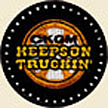 1973
1973 |
Toute l’année, 1973 : en plus de sa formule musicale Top 40 gagnante, CKGM multiplie les concours en ondes, tous plus captivants les uns que les autres. Par contre, aucun ne fait jaser autant cette année-là que le fameux concours “Don’t say hello, say I listen to CKGM” : lorsque votre tétéphone sonne, ne dites pas “bonjour”, répondez plutôt en disant “J’écoute CKGM” et gagnez instantanément $1,000.00 ! . Pour une somme semblable, c’est le beau risque à prendre en 1973 !
April 29, 1974: Greg Stewart joins 98 CKGM as Music Director and as pinch-hit weekend morning show host. Greg will guide the "Super 98" musically through most of the station's golden era, remaining until 1978, then moving on to program CJFM Montréal.
April 29, 1974 : CKGM accueille un nouveau directeur musical, Greg Stewart. Ce dernier assurera aussi l'animation des matins de weekends sur les ondes du "Super 98". C'est sous sa supervision du produit musical en ondes que CKGM atteindra son apogée.
June 10, 1974:
Marc Denis
debuts on 98 CKGM's all-night show. Marc would soon move to the swing shift and then, on to weekday evenings where he holds fort jocking bilingually for many years, closing out at CKGM on PM drive in 1980. Marc begins shortly thereafter a 15-year run as TV host or co-host of the annual
Québec Muscular Dystrophy Telethon with many more decades of radio gigs along the way in Montr√©al and Toronto (CJEZ-EZ Rock, CJBC Radio-Canada)
Le 10 juin, 1974 : ce sont les débuts de l'animateur bilingue Marc
Denis √† la fr√©quence 980 CKGM en tant qu'oiseau de nuit. Marc acc√®de peu de temps apr√®s aux soir√©es de weekend et ensuite, aux soir√©es de semaine. Il terminera aux commandes du retour √† la maison √† CKGM en 1980. Suivront peu de temps apr√®s quinze ann√©es d'animation au Téléthon de la dystrophie musculaire ainsi que plusieurs d√®cennies d'animation √† la radio montr√©alaise dont √† CKOI, CJFM (Mix 96), CKAC, CJAD, CFGL (Rythme FM), CFQR (Q 92), CINW (AM 940) et √©galement pendant quelques ann√©es √† Toronto (EZ Rock, CJBC Radio-Canada)
December 2, 1975: 98 CKGM program director Tom McLean launches
La “Connection” Française
as bilingual personality
Marc “Mais Oui” Denis (10pm-1am) is joined by switch-hitting colleagues Rob Christie (6-10pm) and Scott Carpentier (1am-6am) to form a triple threat radio team. The trio achieves immediate success in Montréal playing the hits and entertaining on-air alternating from English to French and back again. A big hit with listeners, mais oui, but a controversial issue with the CRTC as complaints soon file in from French radio stations in the market understandably upset by what is viewed as an illegal “advantage” by CKGM (see January 1, 1980 CKGM History Brief). |
 1973-76
1973-76 |
La “Connection” Française as a trio eventually ends with the departure of Scott Carpentier in early 1977. Rob Christie moves on in late 1978 while Marc “Mais Oui” Denis continues bilingually as lone outlaw on CKGM until 1980.
Le 2 décembre, 1975 : CKGM lance officiellement
La “Connection” Française,
un trio d’animateurs fort original qui anime en ondes en alternant de l’anglais au français. Les deejays bilingues Rob Christie et Scott Carpentier se joignent à Marc “Mais Oui” Denis déjà en place depuis 1974. Le triumvirat radiophonique fait la pluie et le beau temps à Montréal, de décembre 1975 jusqu’au début de 1977. Le public adore mais le CRTC doit se pencher sur ce brûlant dossier suite aux plaintes légitimes des stations francophones qui crient à l’injustice. Ces dernières entreront elles-mêmes dans le jeu de l’illégalité en riposte, devenant elles-mêmes fautives en refusant de respecter leurs quotas musicaux francophones. Tout un panier de crabes ! Le CRTC tranchera finalement en 1980 (voir Ephéméride historique de CKGM du 1 ier janvier, 1980)
July 17-August 1,
1976: CKGM’s Marc
Denis and broadcaster/actress Kelly Ricard * are chosen as in-house PA announcers for the gymnastics competitions held at the Forum as part of the 1976 Montréal Summer Games. Little did they know they would be called upon to confirm to the world an Olympic Gymnastics first: not one…but seven perfect “10” scores achieved by the darling of the Games, 14-year-old Romanian gymnast Nadia
Comaneci. Nadia ! Nadia ! Nadia !
Le 17 juillet-Ier août, 1976 : l’animateur
Marc
Denis de CKGM et la comédienne-animatrice Kelly Ricard * sont choisis comme tandem d’annonceurs-maison aux
Jeux
d’été '76 de Montréal
pour les compétitions
de gymnastique ayant lieu au Forum. Personne ne se doute que la
petite gymnaste roumaine Nadia Comaneci est sur le point de ré-éditer l’histoire
olympique avec sept notes parfaites de “10”. Ses médailles
: trois d’or, deux d’argent et une de bronze.
December
13, 1976: 98 CKGM achieves the highest cumulative
audience figures in its history: 779,800 listeners.
Outstanding figures considering the station is an English-language-licensed
outlet...playing hit music on the AM band...in a predominately
French-speaking market. One of the memorable CKGM voices of 1976 is the Chucker,
Chuck Morgan *.
|
|

1976-1982 |
Le 13 décembre, 1976 : CKGM obtient les plus imposantes cotes d’écoute cumulatives de son histoire soit 779,800 fidèles. Près de 40% de son auditoire est...francophone !
CKGM n'est devancée que par
CKAC 730 et
1280 CJMS.
All Year, 1977: a particularly memorable 12 months of concerts and record crowds in Montréal as 98 CKGM presents (or welcomes) the hottest acts of the day at the Forum: Queen (January 26), Peter Gabriel (March 23), the Eagles (March 29), Al Stewart (April 16), Peter Frampton (August 16), Rod Stewart (October 10) and Montréal's own Gino Vannelli (November 25). The Big O is now also a viable concert venue as
CKGM presents Emerson, Lake and Palmer
there in front of 78,800 fans on August 26. This mega ELP concert evening comes
straight on the heels of the 80,000-patron Pink Floyd extravaganza at Olympic Stadium only a few weeks earlier (July 6). Note: the Montréal Alouettes football club sets a CFL attendance record of its own at the Big O later that fall as Montréal hosts the Grey Cup on November 27, 1977. The Als trounce the visiting Edmonton Eskimos 41-6 in front of 68,318 fans. The Great 98, of course, is part of the week-long Grey Cup party in the city with the The Great 98, of course, is part of the week-long Grey Cup party in the city with the
“CKGM Ralph Lockwood Grey Cup Breakfast” broadcasting live from
Hotel Bonaventure’s Le Portage club.
Toute l'année, 1977 : une séquence de 12 mois particulièrement fertile en concerts rock et records de foule à Montréal alors que CKGM présente (ou accueille) les grands noms du jour au Forum : Queen (le 26 janvier), Peter Gabriel (le 23 mars), les Eagles (le 29 mars), Al Stewart (le 16 avril), Peter Frampton (le 16 août), Rod Stewart (le 10 octobre) et le montréalais Gino Vannelli (le 25 novembre). Le Stade Olympique entre lui aussi dans la danse des concerts le 26 août alors que
CKGM présente Emerson, Lake & Palmer
devant plus de 78,800 pélerins. Ce concert suit de quelques semaines à peine la prestation de Pink Floyd au Stade devant une foule record de plus de 80,000 fidèles. Côté football canadien, les Alouettes de Montréal établissent eux aussi un record de foule au pays dans le même édifice, le 27 novembre 1977. Les hommes de Marv Levy écrasent les Eskimos d'Edmonton de Hugh Campbell 41 à 6 devant une assistance monstre de 68,318 spectateurs.
June 6, 1977: Reg Johns arrives at 98 CKGM as the new Program Director, replacing the departing Tom McLean. Reg injects new ideas, energy and focus to the Great 98, all the while introducing music call-out research. He will stay in Montréal at CKGM until April of 1979, then moving on to radio and media challenges in Toronto, Boston, Dallas and San Diego. His departure will make way for CKGM's final Program Director of the Super 70s,
Robert G. Hall.
Le 6 juin, 1977 : un nouveau venu originaire de Winnipeg fait son entr√©e √† CKGM en tant que directeur des programmes. Reg Johns innove en pr√©conisant le sondage t√©l√©phonique hebdomadaire √† l'aide d'√©chantillons sonores aupr√®s de l'auditoire cible pour aider √† d√©terminer les meilleurs choix musicaux pour la station. Il sera en poste √† CKGM jusqu'au printemps de 1979 alors qu'il poursuit sa route qui le m√©nera √©ventuellement √† San Diego o√Ľ il cr√©e son entreprise de services en recherche, marketing et consultation pour la radio nord-am√©ricaine.
May 25, 1978: the Montréal Canadiens win their 21st Stanley Cup defeating the Boston Bruins 4 games to 2. Meanwhile on the radio, it is time to settle the score. CKGM Montréal’s Marc “Mais Oui” Denis has challenged his WVBF Boston confrères every game-night of these finals through some good-natured on-air phone calls with back-and-forth bravado. The wager? The Bruins win the Cup and “Mais Oui” must parade in his Canadiens’ jersey at the mercy of Boston fans in their Stanley Cup parade (yeah right...in their dreams!). Canadiens win the Cup and someone from WVBF must fly in and suffer the abuse from Habs fans during the victory parade down Ste-Catherine Street. (Now that’s more like it!). WVBF’s Jeff Baker draws the short straw and experiences a stay in Montréal
he is not about to forget. The eggs and ketchup aren’t for breakfast! 
Le 25 mai, 1978 : les Canadiens de Montréal remportent la 21ième Coupe Stanley de leur histoire. A la radio, il est temps de régler les comptes. La gageure entre les stations CKGM de Montréal et WVBF de Boston est la suivante : si les Bruins gagnent la coupe, Marc “Mais Oui” Denis de CKGM, tout de bleu-blanc-rouge vêtu, doit subir les abus des partisans bostonnais lors de leur défilé à Boston...si les Canadiens sortent vainqueurs, un animateur de WVBF doit réciproquer à Montréal. Résultat à prévoir : c’est un Jeff Baker de WVBF fort anxieux qui se présente à Montréal pour le défilé de la rue Ste-Catherine, vêtu de son beau chandail des Bruins…qui ne restera pas “beau” longtemps. Bon prince malgré tout !
June 12, 1978: John Keogh joins CKGM as the new Music Director and as Director of Research and Development. He takes over the chair recently left vacant by former MD Greg Stewart. Music call-out research is by now the main tool relied upon in the decision-making process of determining what tunes are best play-listed at 98 CKGM and for what time frame.
Le 12 juin, 1978 : suite au récent départ de Greg Stewart, c'est John Keogh qui prend la relève à CKGM en tant que directeur musical de la station. John occupe aussi les fonctions de directeur de la recherche et du développement.
All Year, 1979: a high-profile twelve months for pro sports in Montréal. In May, les Canadiens win their 4 th consecutive Stanley Cup while the Expos conclude in September what would become the franchise’s second-best season ever (95‑65). On 980 November, the CKGM Ralph Lockwood Grey Cup Breakfast entertains live once again, this time, from Montréal's Hyatt Regency Hotel during Grey Cup Week in the city. Unfortunately, the Edmonton Eskimos play spoilers by upsetting the hometown Alouettes 17 to 9 at Olympic Stadium. Meanwhile, CKGM’s Marc "Mais Oui" Denis sets out in search of “Montréal’s Most Popular School” in the last few months of the decade. Following weeks of petitions, on-air challenges and competitions, the title is finally claimed by Bialik High School of Côte St-Luc. Their prize: a strobe light-dry ice dance party extravaganza for the school emceed by “Mais Oui” and dinner at Montréal’s legendary ribs & chicken eatery, the BarB‑Barn, for Bialik’s winning class. Other notable voices of the CKGM of 1979: the bodacious
Buster Bodean
and the always-delightful
Omega Medina.
Toute l’année, 1979 : toute une période de douze mois pour les équipes sportives de Montréal. Le Tricolore remporte une 4 ième Coupe Stanley consécutive en mai pendant que les Expos terminent leur campagne en septembre avec la seconde meilleure fiche de leur histoire. CKGM s’implique à fond en novembre en diffusant "The CKGM Ralph Lockwood Grey Cup Breakfast" en direct cette fois de l'Hôtel Hyatt Regency de Montréal pendant toute la semaine de festivités. Dommage que les Eskimos d’Edmonton doivent gâcher la fête pour les partisans locaux en disposant des Alouettes par la marque de 17 à 9. De son côté, Marc “Mais Oui” Denis couronne “le High School le plus populaire de Montréal” à l’automne suite à plusieurs semaines de pétitions, de défis et compétitions en ondes. C’est finalement Bialik High School du quartier Côte St-Luc qui l’emporte. En plus du titre, l’école hérite d’une soirée dansante animée par Marc "Mais Oui" Denis et d’un souper au poulet et côtes levées au BarB‑Barn pour la classe gagnante de Bialik High School.
December
10, 1979: 98 CKGM relinquishes its crown in
the Maisonneuve Broadcasting family as it is finally surpassed
in cume listernership by sister-station 97.7
CHOM-FM. CKGM: 558,700 (Total
Cume, 7+)...CHOM: 648,800 (Total Cume, 7+) (Source: BBM Montréal,
Fall Radio Ratings, 1979)
Le 10 décembre, 1979 : CKGM est finalement vaincue
par sa station soeur CHOM-FM
aux cotes d’écoute cumulatives. Le début
de la fin d’une époque. |
|

1976-1979 |
|
Special
Edition
Bilingual Pin Macaron à
édition spéciale bilingue |

January
1, 1980: 98 CKGM (along with sister-station
CHOM-FM) are officially no longer permitted to use “conversational”
French during daily broadcasts as ruled by the CRTC (Canadian
Radio and Telecommunications Commission). “Common denominational”
French only. The decision followed years of complaints by French-language
stations that the
“bilingual liberties”
taken by certain English-language stations were eroding their listenership. The
verdict for French-language stations: “common denominational”
English only on-air and respect of francophone music quotas
s.v.p.
Le 1ier janvier, 1980 : après plusieurs années
de bisbille entre stations francophones et anglophones à
Montréal, le CRTC tranche enfin le débat annoncant
une décision sans équivoque, à savoir la
cessation de la radio bilingue ( surtout du côté
anglophone) et du non-respect des quotas musicaux (stations
francophones) |
|

1979-1980
CKGM Montréal, Official Station
of 1980 Lake Placid Winter Games
La station officielle des Jeux
d’hiver de Lake Placid
|
May 5, 1980:
An armed
gunman enters the CKGM studios at 1310 Greene Avenue, ostensively
demanding to air his pre-Québec referendum views on the radio.
A half dozen alerted (and alert) MUC policemen do a remarkable job
of neutralizing the madman, not before many shots are fired inside
the offices. On-air during the ordeal: swing dj Mitch Snaden while
program director Robert G. Hall is taken hostage. Miraculously,
no one is injured after some tense and terrifying minutes.
Le 5 mai, 1980 : un individu
armé fait irruption dans les bureaux et studios de CKGM,
situés au 1310 rue Greene. Apparamment il exige de présenter
en ondes ses opinions sur le référendum prochain sur
l’avenir du Québec. Une demi-douzaine de policiers
de la CUM se faufilent sur les lieux et réussissent à
maîtriser l'énergumène, suite à un échange
de plusieurs coups de feu dans les corridors. Grâce à
leur brio, ces derniers réussissent à éviter
le pire. Toute une frousse pour les employés !
August 20,
1985: CHUM Limited purchases Maisonneuve Broadcasting
(CKGM & CHOM) from
Geoff Stirling * (Apache Communications).
Le 20 août, 1985 : CKGM (et sa station soeur
CHOM-FM) changent de proprios. Le réseau CHUM fait
l’acquisition de Maisonneuve Broadcasting.
|
|

1983-1986 |
January 15, 1986:
CKGM
switches to "Lite Rock, Less Talk" (later to become
"Favourites of Yesterday & Today") thus, dropping
the Top 30 /40 /50 hit music the station had become largely identified
with by Montrealers
and legions beyond since 1959.
Le 15 janvier, 1986 :
CKGM abandonne le format Top 40
pour adopter une formule adulte-contemporain.
 1986-1987 October 30, 1988:
Montréal radio icon Ralph
Lockwood * bids adieu to the city on his final weekend show on 800 CJAD. Ralph is returning home to Pennsylvania to take on morning duties at WSBA, York Penn. Lockwood had been 980 CKGM’s high profile funnyman morning show host from 1972 to late 1981, making a brief comeback in 1985. During the late 80s he had also hosted a lifestyles TV program on CFCF 12 called
“Hi Noon / The Ralph Lockwood Show”. Prior to CKGM, Ralphie had hosted PM and AM drive on rival
Top 40 outlet
1470 CFOX
during the late 60s.
“How’s your bird?” as Lockwood used to say. 
Le 30 octobre, 1988 : l’ex-morningman de
CKGM,
Ralph Lockwood *, fait ses adieux aux auditeurs montréalais
sur les ondes de CJAD. Un nouveau défi
l’attend dans son état natal de
la Pennsylvanie à la
station WSBA
de York, Penn. Ralph avait été morningman à
CKGM de
1972 à 1982 ainsi que l’animateur de l’émission
de services “Hi Noon / The Ralph Lockwood Show” sur
les ondes de CFCF 12 dans les années 80. M. Lockwood
avait fait ses débuts en ville sur 1470 CFOX
fin des années 60.
“Quelles sortes de l√©gumes avez-vous
?” comme le disait si bien Ralphie.
February 10,
1989: 980
CKGM becomes CHTX (980 Hits) as the "Lite Rock, Less Talk" / "Favourites Of Yesterday And Today" formats
make way for Top 40 again but it is the end of an era as the
C-K-G-M call letters disappear from the Montreal airwaves
albeit (only temporarily).
 Le 10 février, 1989 : un retour de courte dur√©e au son
Top 40 s'annonce et un changement d'appellation pour C-K-G-M qui devient (temporairement)...CHTX.
Le 10 février, 1989 : un retour de courte dur√©e au son
Top 40 s'annonce et un changement d'appellation pour C-K-G-M qui devient (temporairement)...CHTX.

September 14, 1990:
CHTX (980 Hits at 10,000 watts) moves to 990 kHz with a power increase
to 50,000 watts. 990 Hits
is born and broadcasting in AM stereo. New transmitter site:
Ville de Mercier Québec.
Le 14 septembre, 1990 : CHTX
passe de la fréquence 980 (10,000 w) à 990 en stéréo
(50,000 w) sur la bande MA. Le site de transmission est transféré
de St-Constant à Ville de Mercier, Québec.
May
24, 1991: CHTX (990 Hits) becomes CKIS (Oldies 990).
Le 24 mai, 1991 : CHTX change à nouveau d’appellation
et de format. Les hits urbains de CHTX font place aux succès
souvenirs
de CKIS. |
|

1991-1996 |
September 3 - September 6, 1993:
Countdown shows are fixtures throughout the years of current hit music or oldies formats on 980 or 990 AM. In keeping with tradition, the former 980 / 990 CKGM / CHTX, now CKIS Oldies 990 Montréal, runs the mammoth Top 500 Oldies Countdown in 1993. The event begins Friday Sept. 3rd and concludes Labour Day Monday the 6th. The No.1 song on this day ? Click on the link above to find out !
Le 3 au 6 septembre, 1993 : peu importe les lettres d'appel ou la position au cadran, les Décomptes musicaux sont une tradition à travers les années de formats musicaux aux fréquences 980 ou 990 à Montréal. Ceci dit, le weekend de la Fête du travail de 1993 en réserve tout un sur les ondes de CKIS Oldies 990. C'est le marathon du Top 500 des plus grands succès "Oldies". Qui termine en tête ? La réponse en cliquant sur le lien bleu !
January 15, 1996:
CKIS switches back to the classic C-K-G-M call
letters on  990 and adopts a “Gen X-Talk” format (“Talk
Radio with Attitude”). 990 and adopts a “Gen X-Talk” format (“Talk
Radio with Attitude”).
Le 15 janvier, 1996 : CKIS redevient C-K-G-M
sur la fréquence 990 et inaugure un format de lignes ouvertes
à caractère provocateur.
1996-1997
January 22, 1998: CKGM
allows use of its 990 frequency by CJAD in the spirit of cooperation for a minimum of three months. 800 CJAD, a heritage News-Talk outlet in Montréal, had lost all of its transmission towers earlier in the month following the infamous ice
storms of the winter of 1998. Emergency broadcasting begins
four days later on the 26th. Note: later that spring on April 17, 1998, CJAD’s beloved morningman
George Balcan
* officially retires and delivers his final breakfast show on 800 that morning.
Le 22 janvier, 1998 : CKGM
offre sa fréquence 990 à sa voisine des ondes, 800
CJAD, dont les quatre tours émétrices s’étaient
écroulées le 9 janvier suite au fameux “verglas”
de l’hiver 1998. Ce geste de coopération permet
ainsi de jumeler les efforts et d’assurer une radiodiffusion
d’urgence durant ces semaines éprouvantes.
June
12, 1998: With CJAD back home on 800,
CKGM is
reborn again as
“Oldies 990”.
Le 12 juin, 1998 :
CKGM se métamorphose à nouveau en radio à
format succès souvenirs suite au retour de CJAD à
sa fréquence 800. |
|

1998-2001 |
May
7, 2001: CKGM (“Oldies 990”) drops the gold to switch to a “Sports Talk” format as part of the CHUM radio sports network (“Team 990”).
Le 7 mai, 2001 : CKGM adopte un format de lignes ouvertes
sportives en tant que diffuseur montréalais du réseau
canadien The Team (CHUM). |
|

2001-2011 |
August 27, 2002:
All but three CHUM radio sports network stations across Canada drop
“Sports Talk” to return to the “Oldies”
format. One of the exceptions is Team 990 Montréal.
Le 27 août, 2002 : Le réseau canadien The
Team (CHUM) abandonne le format de la ligne ouverte sportive pour
un retour aux succès souvenirs partout sur le réseau
sauf à Vancouver, Ottawa et... Montréal où
la ligne-ouverte sportive règne jusqu’à nouvel
ordre à Team 990.
September 29, 2004:
Just like 980 CKGM was for the Expos’ first season back in
1969, 990 CKGM / The Team is the official English-language voice
of Montreal Expos baseball on this night in 2004...for the final
home game in Expos franchise history at Olympic Stadium in front
of 31,395 fans, on hand to bid adieu.
A sad evening as the imminent
move to Washington DC is finally confirmed earlier in the day. Ironically,
the visiting Florida Marlins’ broadcast voice is... long‑time
former Expos original play-by-play man,
Dave Van Horne.
Dave crosses over to join Elliott Price in the Team
990 booth if only for the 7th inning for a symbolic
last play-by-play call from Montréal on CKGM / Team 990.
The
Marlins show no mercy by crushing the dispirited locals, 9 to 1.
Still ironically, the Expos close out their history a few days later
(October 3) where it all began on April 8, 1969...in New York with
a crushing 8-1 defeat and
franchise finale
against the Mets at Shea Stadium. Au revoir Expos and thanks for the 35 years+
of memories. 
Le 29 septembre, 2004 :
une triste soirée alors que “990 CKGM / The Team”
diffuse le dernier match à domicile anglophone de l’histoire
des Expos à Montréal, une cuisante défaite
de 9 à 1 contre les Marlins de la Floride devant 31,395 partisans. La confirmation
officielle survient enfin la journée-même suite à
plusieurs années d’incertitude : l’équipe
quitte en permanence pour Washington DC. Comme le hasard fait toujours
bien les choses, les Expos terminent leur existence le dimanche
suivant 3 octobre en rendant visite à la même équipe
contre laquelle ils avaient fait leurs débuts en 1969...les
Mets à New York (Défaite de 8 à 1) Côté
radio francophone, ce sont les fidèles descripteurs Jacques
Doucet et Marc Griffin qui font
les adieux des Expos à Montréal sur 98,5 MF. Merci
à ‘Nos-z-Amours’ pour les 35 années et plus de souvenirs!
November 21, 2009: It's the CKGM 50th Anniversary Alumni Reunion in Montréal, bringing together the on-air alumni and staff from 5 decades of broadcasting on 980 CKGM and on 990 in all incarnations on the AM dial:
980 CKGM (1959-1989), 980 CHTX (1989), 990 CHTX (1990), 990 CKIS (1991-1995), 990 CKGM (1996-2009). Over 150 alumni
travel
from
near and far to attend this once-in-a-lifetime
event at
Club Soda, Montréal. What a party !
 Le 21 novembre, 2009 : c'est la date prévue pour souligner et fêter fièrement le 50 ième anniversaire de la station CKGM
Le 21 novembre, 2009 : c'est la date prévue pour souligner et fêter fièrement le 50 ième anniversaire de la station CKGM
à Montréal, incarnations 980 ou 990 sur la bande MA, soit: 980 CKGM (1959-1989), 980 CHTX (1989), 990 CHTX (1990), 990 CKIS (1991-1995), 990 CKGM (1996-2009). Plus de 150 'anciens' répondent à l'appel et se déplacent pour participer à cet événement historique au Club Soda de Montréal. Toute une fête réussie dans l'allégresse !
December 7, 2009: Happy 'Solid Gold' 50th Anniversary to CKGM !
Le 7 décembre, 2009: Joyeux 50ième anniversaire à CKGM, une station 'en or' !
June 22, 2011: CKGM (THE TEAM 990), now Bell Media-owned, becomes the official voice of the Montreal Canadiens with exclusive English radio broadcast rights to all of the team's games over the next seven seasons. The deal makes THE TEAM 990 home to all 82 regular season Habs games, all Canadiens playoff games and all pre-season games. This marks the first time THE TEAM 990 will have radio broadcast rights to Canadiens games.
 Le 22 juin, 2011 : CKGM (THE TEAM 990), maintenant une
Le 22 juin, 2011 : CKGM (THE TEAM 990), maintenant une
propriété du géant Bell Media, devient la voix officielle anglophone
des Canadiens de Montréal. La station acquiert également les droits
de diffusion en anglais de tous les matchs pré-saison du Tricolore ainsi que tous ceux en saison régulière et en séries pour les sept prochaines saisons. Une grande premiére dans la riche histoire de CKGM.
October 5, 2011: CKGM (The TEAM 990) is rebranded as TSN Radio 990, home of
the Montreal Canadiens and of the Montreal Impact. The announcement on the day also includes the switch in Winnipeg of Sports Radio 1290 to TSN Radio 1290, the radio home of the Winnipeg Jets and the Winnipeg
Blue Bombers. Linking up with the recently-morphed TSN Radio
1050 Toronto, all three TSN Radio rebrands will work closely
with Bell Media's sports radio stations in Vancouver and Ottawa.
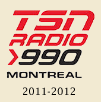
Le 5 octobre, 2011 : Bell Media introduit un changement de pseudonymes pour deux de ses stations radiophoniques à vocation sportive. Voilà que CKGM à Montréal délaisse le nom The TEAM 990 après dix ans pour adopter le nouveau "pseudo" de TSN Radio 990 et que Sports Radio 1290 à Winnipeg devient TSN Radio 1290 le même jour. Suite à la métamorphose récente de TSN Radio 1050 à Toronto, les trois nouvelles jumelles vont également collaborer de prés avec les propriétés de radios sportives de Bell Media à Vancouver et Ottawa.
July 10, 2012: In a surprise statement, Bell Media announces that it has filed an application with the CRTC expressing its intention to convert the recently-rebranded English-language (CKGM) TSN Radio 990 to a French-language sports entity, RDS Radio 990, in Montreal. The decision results from Bell's acquisition of Astral Media including English-language trio CJAD-CHOM-VIRGIN), announced in March 2012, and the CRTC's Commercial Radio Policy that outlines certain limitations surrounding the ownership of multiple radio stations in a given market. English-language broadcasts of the Montreal Canadiens would move (back) to Astral's CJAD 800, pending CRTC approval. A shift from 990 to 690 on the AM dial for the station is also part of the equation. The plot thickens. Stay tuned...
Le 10 juillet, 2012 : Bell Média prend tout le monde par surprise en annonçant qu'elle a soumis une demande auprès du CRTC afin de convertir la station anglophone CKGM) TSN Radio 990 en une de langue française, RDS Radio 990, à Montréal. La décision de transformer TSN Radio 990 en RDS Radio 990 découle de l'acquisition récente d'Astral Média par Bell, annoncée en mars 2012, et de la Politique du CRTC sur la radio commerciale qui stipule certaines contraintes quant à la concentration de propriété de plusieurs stations de radio au sein d'un même marché. La radiodiffusion anglophone des matchs des Canadiens de Montréal passera ainsi (de nouveau) à CJAD 800, propriété d'Astral, sous réserve de l'approbation du CRTC. Une mutation de 990 vers la fréquence libre 690 MA fait aussi partie de la polémique. C'est à suivre...
September 4, 2012: The switch becomes official as CKGM TSN 990
moves to 690 on the AM dial in Montréal. This is the third frequency
home in the long history of CKGM: at 980 (1959 à 1990),
followed by 990 (1990 à 2012) and, on this day in 2012,
a new home on 690.
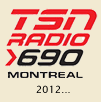
Le 4 septembre, 2012 : la mutation de CKGM TSN 990
vers la fréquence 690 MA devient réalité. C'est la troisième niche MA pour la station dans son grand historique. Après 31 ans à la fréquence 980 suivi de 22 années à proximité au 990 MA, voici maintenant CKGM TSN 690 qui voit le jour.
June 27, 2013: The CRTC approves BCE Inc.'s $3.4 billion dollar takeover of Montreal-based media giant Astral Media Inc. the second time around, albeit under several requirements and conditions. The decision thus allows BCE to operate four English-language stations in Montreal, CJAD-CHOM-VIRGIN and including CKGM (TSN 690). Given the strong support expressed by Montreal's English community for the latter station, the broadcast
regulator allows the exception but decrees that BCE will have
to maintain its current sports sports format for at least seven
years. As well, Montreal Canadiens broadcasts will remain on
690. CKGM lives on en anglais. Case finally... closed.
Le 27 juin, 2013 : suite à une décision en défaveur de la transaction en 2012, le CRTC approuve cette fois-ci la nouvelle demande de BCE Astral Bell pour l'acquisition officielle d'ASTRAL mais suite à l'imposition de maintes conditions et exigences. Ainsi, le CRTC permet à BCE d'exploiter quatre stations de radio de langue anglaise dans le marché de Montréal, CJAD-CHOM-VIRGIN y compris CKGM (TSN 690). Compte tenu du soutien de la communauté anglophone de Montréal envers cette dernière, le CRTC permet l'exception mais Bell devra conserver son format actuel de langue anglaise axé sur les sports pour une période minimale de sept ans. TSN 690 conserve ainsi la diffusion des matchs des Canadiens de Montréal...in English. L'historique de CKGM maintient son cours. Dossier clos, amen.
September 11, 2013: This is the final broadcast day of CKGM (TSN 690) from the offices and studios at 1310 Greene Avenue in Westmount. The station joins former-Astral-now BellMedia sister-outlets CJAD-CHOM-VIRGIN 96 along with French-language stations NRJ and Rouge-FM in the building at the corner of René-Lévesque and Papineau. Quite the run: the first 9 years at 1455 Drummond St. in Montreal on 980 AM, followed by 45 years at 1310 Greene Avenue in Westmount on 980, then 990, lastly on 690 AM and now, a brand new start at
1717 René-Lévesque Boulevard E. This closes a chapter, if not a book, in the long history of the CKGM call letters...
Le 11 septembre, 2013 : c'est la dernière journée officielle de diffusion pour CKGM (TSN 690) depuis les studios du 1310 de l’avenue Greene à Westmount. Pour seulement la troisième fois de son histoire, CKGM se déplace et aménage cette fois au
1717 boul. René-Lévesque est à Montréal, se joignant ainsi aux stations anglophones CJAD-CHOM-VIRGIN 96 ainsi qu'aux autres anciennes stations Astral du côté francophone, soit NRJ et Rouge-FM. Les 6 propriétés sont maintenant regroupées sous un même toit, coin René-Lévesque et Papineau, et sous la bannière BellMédia. Les bureaux sur Greene sont vides après 45 ans mais, les fantômes « 980 et 990 » demeurent...
September 22, 2017: On-air mainstay Robert Wagenaar aka Too Tall calls it quits, delivering his final broadcast on this day, thus, making his way off into the sunset following a remarkable 40-year run on the same Montreal radio station, CHOM-FM 97.7 (Throughout that exceptional span, Too Tall also hosted briefly on AM Top 40 sister station, CKGM). Dozens of industry friends, colleagues, musicians and listeners phone in or drop by to bid an emotional farewell to the uber-vertical wonder in the CHOM studios. Too Tall's last song ? Appropriately, The Load Out / Stay (Just A Little Bit Longer) by Jackson Browne.
Le 22 septembre, 2017 : l'immuable animateur Robert Wagenaar,
alias "Too Tall", tire sa r√©v√©rence suite √† 40 ann√©es d'animation sur les ondes d'une m√™me station, soit √† CHOM-FM, Montr√©al. C'est un parcours remarquable et une retraite qui signale la fin d'une s√©quence de long√©vit√© qui ne se reverra pas de sit√īt dans le monde de la radio ou ailleurs. En plus du torrent d'accolades remplies d'√©motion en ondes de la part de coll√®gues, musiciens, amis et auditeurs au cours de cette derni√®re √©mission en ce jour, "Too Tall" a droit en soir√©e √† un party hommage en son honneur au Club Soda de Montr√©al.
September 21, 2019: : It's CKGM Rendez-Vous With You 2019, The 60th Anniversary Alumni Reunion at the Sir Winston Churchill Pub in Montreal.
A gathering of 150 party people, Alumni and guests, representing 6 decades
of broadcasting on CKGM (980, 990 and 690 AM), travel from near and far to reconnect and celebrate the iconic radio institution founded by the late great Geoff Stirling and launched on December 7th of 1959. Joining in as well for cocktails are several broadcast staffers, most with a CKGM career connection, 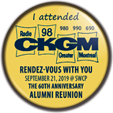 from other Montreal stations such as CHOM (aka CKGM-FM in early years), CJAD, CJFM, CFOX, CTV and CBC Montreal. Just like 10 years prior, a magical evening of joy and memories unfolds well into the night, this time for the station's Diamond Jubilee. Happy 60th CKGM ! from other Montreal stations such as CHOM (aka CKGM-FM in early years), CJAD, CJFM, CFOX, CTV and CBC Montreal. Just like 10 years prior, a magical evening of joy and memories unfolds well into the night, this time for the station's Diamond Jubilee. Happy 60th CKGM !
Le 21 septembre, 2019 : CKGM Rendez-Vous With You 2019, les retrouvailles du 60ième bat son plein au Pub Sir Winston Churchill de la rue Crescent √† Montr√©al pour f√™ter 6 d√©cennies d'antenne "CKGM" (980, 990, 690 MA). Une brochette de 150 anciens r√©pondent √† l'appel et viennent c√īl√†brer le 60i√®me anniversaire des l√©gendaires lettres d'appel C-K-G-M, station fond√©e par l'entrepreneur et visionnaire Geoff Stirling
et mise en ondes à Montréal le 7 décembre 1959. Les convives reviennent au bercail de partout, autant des Etats-Unis que d'à travers le pays, pour lever
un verre ou deux ensemble à ce grand cocktail et renouer les amitiés. Mission accomplie encore une fois. Joyeux 60ième à CKGM, le "diamant" préieux des belles années de la radio montréalaise !
January 12, 2020: One of the highest profile on-air personalities in the history of CKGM, ex-morningman Ralph Lockwood * (1972-1981, 1985-1987) passes away in Dallastown PA at age 80, following a lengthy illness.
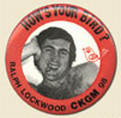
Ralphie is remembered by the industry and fans, here:
Ralph Lockwood Dec. 1939 - Jan. 2020, The 80 Tributes
Le 12 janvier, 2020: L'un des noms mythiques de l'histoire de CKGM, l'ex-morningman Ralph Lockwood *, s'√©teint √† l'√Ęge de 80 ans dans sa Pennsylvanie natale, des suites d'une longue maladie. Il aura laiss√© sa marque ici √† 980 CKGM et √† 1470 CFOX dans les ann√©es 60, 70 et 80 ainsi qu' √† l'animation du "Ralph Lockwood Show" √† CFCF 12 (CTV Mtl) dans les ann√©es 80. Lisez les 80 Hommages √† celui que l'on surnommait le "Birdman", ici:
Ralph Lockwood Dec. 1939 - Jan. 2020, The 80 Tributes
March 14, 2021: George Morris * passes away in Montreal of heart disease,
at age 78. George is one of the best remembered high profile evening deejays
of the Super 60s era at 98 CKGM, known from 1962 to 1968 as the energetic "Buddy Gee". Following his CKGM heyday, George leaves active
radio behind, 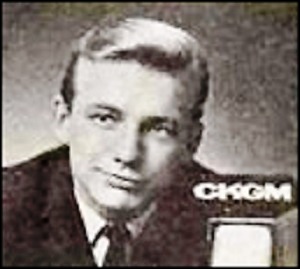 creates Listen Audio multimedia studios in
Old creates Listen Audio multimedia studios in
Old
Montreal and becomes one of Canada's leading voiceover talents."Buddy Gee, The Big Boss with the Hot Sauce"
is remembered, here:
George Morris April 1942 - March 2021, A Buddy Gee Salute
Le 14 mars, 2021: L'un des deejays les plus populaires des ann√©es 60 √† Montr√©al, George Morris *, d√©c√®de √† l'√Ęge de 78 ans. M. Morris excelle surtout en soir√©e √† CKGM, de 1962 √† 1968. Sous le sobriquet de "Buddy Gee", il fait partie de la vive comp√©tition radiophonique en conqu√™te des ados. Suite √† CKGM, il quitte la radio
pour fonder sa bo√ģte multim√®dia, Listen Audio, o√Ľ il oeuvre et devient l'une des voix publicitaires les plus recherch√©es au pays. Lisez les hommages √† celui que l'on surnommait
"Buddy Gee", ici:
George Morris April 1942 - March 2021, A Buddy Gee Salute
|
The
CKGM watch continues...
Nous gardons
CKGM à l’oeil...
Contributions:
|
|
Online since July 1, 2003 / En
ligne depuis le 1ier juillet, 2003
This page is
updated regularly / Nous
faisons des mises à jour régulièrement.
* Indicates deceased / indique décédé-ée
Your contribution towards the maintenance, updating and sustaining of our
980 CKGM Montreal Super 70s Tribute Page online is much appreciated.
Merci pour votre contribution envers l'entretien, la mise à jour et pérénité
en ligne de notre site Hommage à la radio 980 CKGM Super 70.
Thank you for your assistance and long life online to Montreal's Great 98 !
|











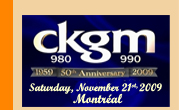
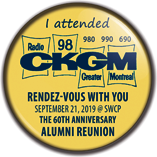





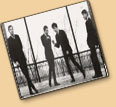
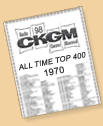
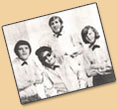
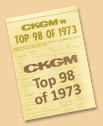
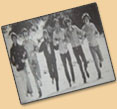
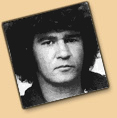
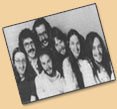
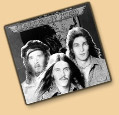
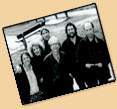

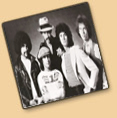
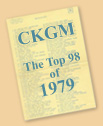
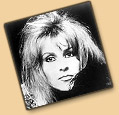

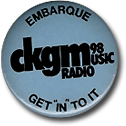
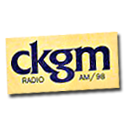
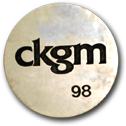
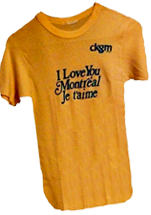
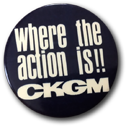
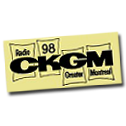
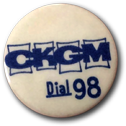

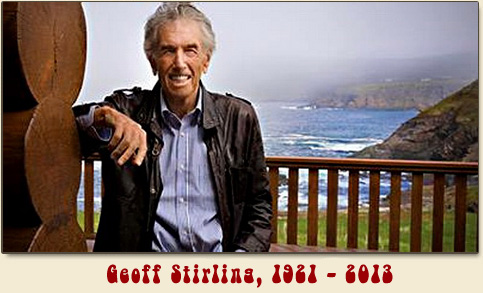





 The Great 98, of course, is part of the week-long Grey Cup party in the city with the
The Great 98, of course, is part of the week-long Grey Cup party in the city with the





 990 and adopts a “Gen X-Talk” format (“Talk
Radio with Attitude”).
990 and adopts a “Gen X-Talk” format (“Talk
Radio with Attitude”).





 from other Montreal stations such as CHOM (aka CKGM-FM in early years), CJAD, CJFM, CFOX, CTV and CBC Montreal. Just like 10 years prior, a magical evening of joy and memories unfolds well into the night, this time for the station's Diamond Jubilee. Happy 60th CKGM !
from other Montreal stations such as CHOM (aka CKGM-FM in early years), CJAD, CJFM, CFOX, CTV and CBC Montreal. Just like 10 years prior, a magical evening of joy and memories unfolds well into the night, this time for the station's Diamond Jubilee. Happy 60th CKGM !
 creates Listen Audio multimedia studios in
Old
creates Listen Audio multimedia studios in
Old